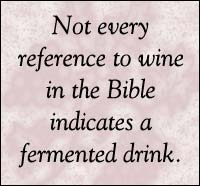ANGEL MANUEL RODRIGUEZ
I have not found in the Bible any explicit prohibition against
the consumption of wine. Where is the biblical support for the church�s position?
 o answer your question thoroughly requires more space than
I have available here. What makes a short answer difficult is that there are
a significant number of biblical texts to consider, and at times the texts move
from what appears to be acceptance of wine consumption, to moderate use of it,
to rejection.
o answer your question thoroughly requires more space than
I have available here. What makes a short answer difficult is that there are
a significant number of biblical texts to consider, and at times the texts move
from what appears to be acceptance of wine consumption, to moderate use of it,
to rejection.
 Your question requires a careful study of the biblical terminology
for wine, the different contexts in which it is used, and the meaning of that
information for us today. I will point only in a general way to the biblical
teaching on this subject.
Your question requires a careful study of the biblical terminology
for wine, the different contexts in which it is used, and the meaning of that
information for us today. I will point only in a general way to the biblical
teaching on this subject.
1. Comments on the Terminology: The Old Testament employs
three main words to refer to wine. The first is shekar, which is usually translated
�strong drink,� but is now acknowledged, based on the use of the same root in
other ancient languages, to refer to what we know as beer. It was definitely
intoxicating (Isa. 28:7, 8; 29:9), and most probably made from grains. Most
of the biblical references denounce or forbid its use (Lev. 10:9; 1 Sam. 1:15;
Prov. 20:1; Isa. 5:11). Nevertheless, there is a peculiar and unique case that
suggests that it was not necessarily wrong for an Israelite to drink beer (Deut.
14:26).
The second term, tirosh, is used to designate �new wine,�
grape juice (Judges 9:13; Isa. 65:8), the fresh must in the hollow of the winepress
(Hosea 9:2; Micah 6:15; Joel 2:24; Prov. 3:10). Only one passage seems to indicate
that it was intoxicating (Hosea 4:11), but the use of two words for wine in
that text suggests that the intoxicating effect was the result of mixing �old�
fermented wine with �new� unfermented wine.
The third word used for wine in the Bible is yayin, fermented
grape juice (Gen. 9:21; Isa. 28:7). But again, there are several cases in which
it could be referring to unfermented grape juice as it came from the winepress
(Isa. 16:10; Jer. 48:33). The Greek version of the Old Testament uses the same
Greek word, oinos, to render both Hebrew terms tirosh and yayin; and oinos is
the term for �wine� found in the New Testament. The use of that term in the
Old Testament suggests that in the New Testament oinos does not necessarily
designate fermented grape juice.
 2. Use of Wine in the Bible: Wine (yayin) was often part
of the daily diet of the people of Israel (Gen. 14:18; Judges 19:19), and was
also offered to God as a drink offering (Ex. 29:40). In a land where water was
scarce, the juice of the grape was very important and widely used. That same
type of wine was commonly associated with joy (Ps. 104:15), but its ingestion
could lead to immoral behavior (Isa. 5:11, 12), drunkenness (Prov. 20:1), vomiting
(Isa. 28:7, 8), addiction, and hallucinations (Prov. 23:33-35). Its use was
forbidden among priests (Lev. 10:9) and Nazirites (Num. 6:1-4), and not recommended
for kings and rulers (Prov. 31:4). In some cases wine seems to have had a medicinal
function (2 Sam. 16:2; Luke 10:34; 1 Tim. 5:23). The soldiers at the foot of
the cross tried to alleviate Jesus� pain by offering Him wine mixed with myrrh
(Mark 15:23).
2. Use of Wine in the Bible: Wine (yayin) was often part
of the daily diet of the people of Israel (Gen. 14:18; Judges 19:19), and was
also offered to God as a drink offering (Ex. 29:40). In a land where water was
scarce, the juice of the grape was very important and widely used. That same
type of wine was commonly associated with joy (Ps. 104:15), but its ingestion
could lead to immoral behavior (Isa. 5:11, 12), drunkenness (Prov. 20:1), vomiting
(Isa. 28:7, 8), addiction, and hallucinations (Prov. 23:33-35). Its use was
forbidden among priests (Lev. 10:9) and Nazirites (Num. 6:1-4), and not recommended
for kings and rulers (Prov. 31:4). In some cases wine seems to have had a medicinal
function (2 Sam. 16:2; Luke 10:34; 1 Tim. 5:23). The soldiers at the foot of
the cross tried to alleviate Jesus� pain by offering Him wine mixed with myrrh
(Mark 15:23).
3. Implications for Believers: Wine was obviously used among
the Israelites, and its consumption had beneficial as well as damaging effects.
Not every reference to wine in the Bible automatically indicates a fermented
drink. Each passage must be studied by itself. Many have concluded that the
Bible does not teach abstinence from wine, but a moderate use of it. But we
must consider the Bible�s strong language against the use of wine.
The Bible points to abstinence as a better and more excellent
way. Proverbs 23:31, 32 does not simply discourage the use of fermented wine,
but counsels the individual to stay away from it: �Do not gaze at wine when
it is red, when it sparkles in the cup, when it goes down smoothly! In the end
it bites like a snake and poisons like a viper� (NIV). It is that biblical ideal
that Adventists support and promote in a world in which the damaging effects
of alcoholism are painfully well known.
_________________________
Angel Manuel Rodr�guez is an associate director of the Biblical
Research Institute of the General Conference.


